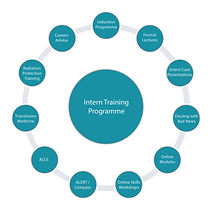
Applying to Ireland


How to apply video.

The 6 Intern Training Networks

Intern Teaching Consists of:
There are 6 intern training networks within the Republic of Ireland and each is attached to a medical school:
-
West/Northwest (NUIG)
-
Dublin/Northeast (RCSI)
-
Dublin/Mid-Leinster (UCD)
-
Dublin/Southeast (TCD)
-
South (UCC)
-
Mid-West (UL)
In 2018 there were 733 intern training posts. Intern training is 12 months, encompassing a minimum of three months in General Surgery, plus three months in General Medicine. Thereafter, there are a further two 3 month rotations to train in Paediatrics, OBGYN, Anaesthesia, Emergency Medicine, Pathology, Psychiatry, Public Health Medicine, Radiology, Surgery, Ophthalmology, Occupational Medicine, Medicine and General Practice.
Each intern must be registed with the Medical Council of Ireland & following successful completion is awarded a "Certificate of Experience". You may apply for trainee specialist divisions following this.
All applicants to Intern posts in the Irish health service must be a graduate or final year student (of whatever nationality) of a Medical School in one of the following EEA countries: Ireland, Norway, Denmark, Sweden, Italy, Lithuania, United Kingdom, Luxembourg, Malta, Poland, Portugal, Iceland or be a graduate or final year student of the RCSI Penang Medical College, Malaysia.
Recruitment is undertaken on the Health Service Executive website.
Application Timeline:
-
Mid/Late October - Opening of Stage 1 of the application process
-
Jan to March - Academic Track matching process for those who progress, after expressing interest in Stage 1
-
March - Invite from the NRS to submit for Stage 2 of the application process, along with Medical Council Registration
-
May/June - NRS begin post allocations, candidates notified, deadline for acceptance given
-
June/July - Contract signing & intern induction
More detailed information of the National Intern Training Program can be found here.
English Language Requirements
The medical council accepts any of the following as evidence of effective communication skills:
-
You have a current Academic IELTS Certificate (dated within the last two years) with an overall band score of 7.0 and a minimum score of 6.5 in each module; or
-
You have passed another equivalent English language test*; or
-
Satisfactory proof that you have been awarded a Higher Qualification listed in Appendix A of the Registration Rules which was awarded by a postgraduate training body in a country where English is the language spoken by the vast majority of the population; ; or
-
Satisfactory proof that your basic medical degree and internship training were completed through English in a country where English is the language spoken by the vast majority of the population, e.g. in Australia or New Zealand over 97% of the population speak English; and in the USA over 95% of the population speak English. This is comparable to Ireland, where over 98% of the population speak English.
-
Cambridge ESOL Certificate in Advanced English (CAE) - CEFR Level C1or C2
-
USMLE if all of part 1 and part 2 have been completed.
-
You have an OET (Category – Medicine) dated within the last two years, with a minimum grade of B in each module.
Pre-Registration Examination System (PRES) Level 3
All applicants who are non-Irish university graduates will need to undertake an examination to prove competence. All European graduates skip what was known as "Level 2" due to the equal recognition of European qualifications. General information about PRES can be found here.
Level 3 takes the form of an OSCE and a written paper. This is a test of the main clinical disciplines of OBGYN, Paediatrics, Psychiatry, Surgery and Medicine/General Practice. A detailed overview of the exam can be found in their handbook.


